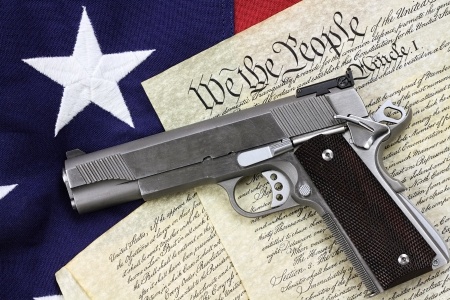To reach a suicide prevention hotline, call the new 988 three-digit hotline or visit suicidepreventionlifeline.org. Suicide prevention services can also be reached at 888-568-1112 or 800-273-TALK (8255).
Repealing a law tucked years ago into the U.S. defense budget could be key in preventing soldiers from killing themselves and others, a committee tasked by the Pentagon to study military suicides found in February.
The Suicide Prevention and Response Independent Review Committee laid out 127 specific recommendations. Among them was one that called on Congress to repeal a law dating back to the 2011 defense budget that prevents the Defense Department from creating or accessing records about guns privately owned by soldiers who do not live on military or federal property.
That information could be helpful when trying to prevent a soldier from killing themselves, the panel found. It is unclear if the law hindered the military’s handling of Robert R. Card II, the 40-year-old Army reservist who killed 18 people and wounded 13 others in Lewiston on Oct. 25, but it could be seen as an obstacle in treating troops with documented mental health issues.
The Army deemed Card so much of a risk to his fellow soldiers after he voluntarily went to a psychiatric hospital in New York, that it banned him from having weapons, handling ammunition, or participating in shooting drills while on military duty in August.
But those restrictions had no effect on Card while he was at home in Bowdoin, even though a fellow reservist reported that Card had threatened to “shoot up” the Army Reserve center in Saco. That was in large part due to the 2011 law. Two years later, it was amended to allow commanders and health providers to ask questions about privately owned guns if there are “reasonable grounds to believe such member is at risk for suicide” or harming others.
Those same people cannot order a soldier to turn over privately owned guns or regulate ownership if those guns are off federal property. They can only ask a soldier to voluntarily store their privately owned guns temporarily at a federal facility or with another trusted source, according to the Army Reserve’s suicide prevention policy.
“The request by the commander will not include any command incentives or disincentives,” the policy says.
The law is so confusing that officers in the military have abandoned asking any questions about any guns a soldier might have at their home if the soldier doesn’t live on a military installation, the report concluded.
“I have heard commanders lament that,” a military lawyer was quoted as saying.
The law, wrapped into the 2011 National Defense Authorization Act, was developed in the wake of the 2009 mass shooting at Fort Hood, Texas — now known as Fort Cavazos — after a soldier shot and killed 13 people and injured 43 others.
Robert Gates, who was the defense secretary under then-President Barack Obama, ordered an independent review of the shooting which subsequently found that the Defense Department did not have a policy governing privately owned firearms. So Gates directed a policy that would apply across the department.
Before then, individual military installations created base-specific regulations that, in some instances, required all service members to register their privately owned firearms even if they were kept off military property, limited the caliber of firearms and ammunition soldiers could have and prohibited soldiers from carrying privately owned guns off base.
Those early restrictions prompted federal legislation championed by then-U.S. Sen. Jim Inhofe, R-Oklahoma, that aimed to prohibit the defense department and military commanders from creating regulations that would infringe on a soldier’s ability to exercise their Second Amendment rights.
A version of Inhofe’s proposal was folded into the National Defense Authorization Act, which laid the most concrete basis military leaders have for legal guidance when it comes to whether or not they can legally restrict a soldier’s access to firearms when they are not on duty.
While mass shootings may be statically rare, it is not rare for a soldier to kill themselves with a gun, according to the Department of Defense’s Annual Report on Suicide in the Military.
During 2022, active duty soldiers from across all military branches killed themselves with a gun 65 percent of the time. On the reserve side, that percentage is higher with 70 percent of reserve soldiers using a firearm to kill themselves. National Guard soldiers use firearms 81 percent of the time to kill themselves.
The committee recommended writing and passing new laws that would protect a soldier’s Second Amendment rights and would specify the penalties for the unlawful use of any firearm information and records collected by the Department of Defense, although the report was criticized by the National Rifle Association.
“Stymied by the American people and their elected representatives in attempts to enact the type of sweeping legislative gun control they desire, the gun controllers in the federal government sometimes lash out at the Second Amendment rights of those who fall more directly under their control,” the gun-rights group wrote in March.
Among Maine’s congressional delegation, Sen. Angus King, an independent who caucuses with Democrats, said he is reviewing the policy recommendations in the report issued earlier this year, a spokesperson said.
The office of Sen. Susan Collins, a Republican, did not directly address the law but said in a statement that the senator is a strong advocate for a comprehensive review of the facts and events leading up to the Lewiston shooting to help prevent future tragedies.
U.S. Rep. Chellie Pingree, a Democrat from Maine’s 1st District, is supportive of repealing the law, a spokesperson said Monday, while the office of Rep. Jared Golden, a Democrat from the 2nd District, did not respond to a request for comment.
















